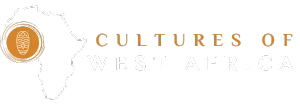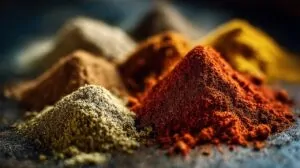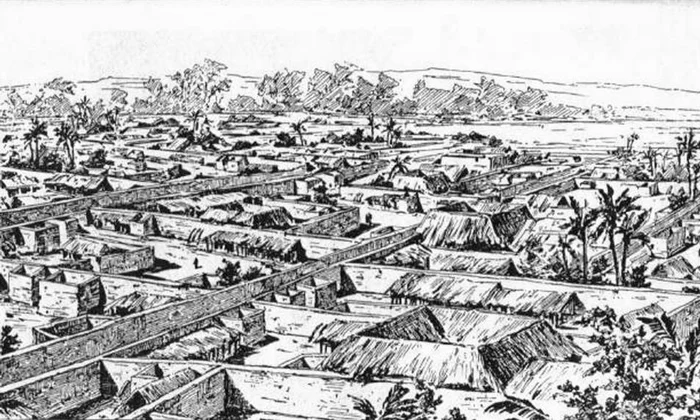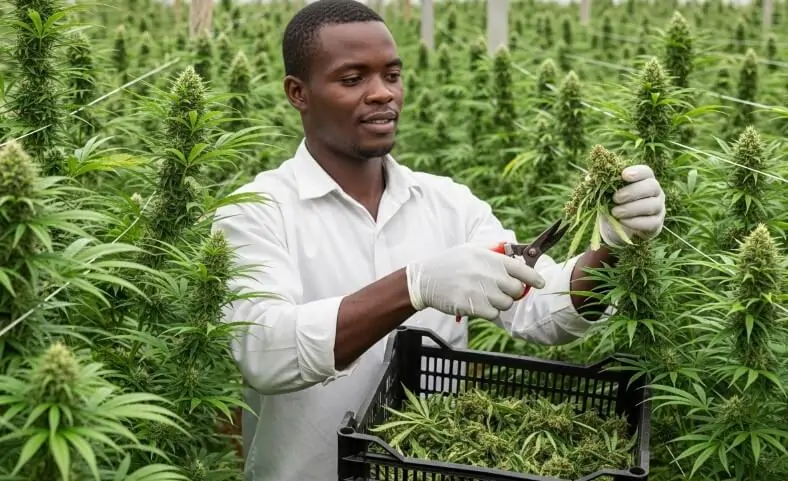
Ghana’s farm economy is about to hit a milestone year. On paper, the changes look like smart reforms: tighter permits for unprocessed tree crop exports and a new legal channel for industrial and medicinal cannabis. In practice, those reforms also create openings for scammers.
Table of Contents
ToggleFarmers, traders, and investors have been warned to stay alert, as opportunists set up fake “consultancies” and “agents” claiming to speed up approvals for a fee.
The country’s key regulators: the Tree Crops Development Authority (TCDA), the Narcotics Control Commission (NACOC), and the Ministry of Food and Agriculture (MoFA), are telling everyone to go only through official channels.
Here’s a detailed look at what is changing, who regulates what, how to apply legitimately, and how to spot scams before they cost you money.
Why 2025 Marks a Turning Point
The new rules are not coming out of nowhere. Ghana has been reshaping its agricultural sector to build value chains beyond cocoa, while also moving to control sensitive crops like cannabis under a transparent legal framework.
Tree Crops
The Tree Crops Development Authority was created under Act 1010 in 2019 to develop six priority tree crops: rubber, cashew, shea, mango, coconut, and oil palm.
In 2023, Parliament passed Legislative Instrument 2471 (L.I. 2471), which spelled out how TCDA would regulate production, processing, and trade.
From 2 May 2025, anyone exporting unprocessed rubber, cashew, or shea must obtain a written permit from TCDA under Regulation 50 of L.I. 2471.
This covers companies and individual traders alike. Shipments without a permit violate the regulations and can lead to penalties under Regulations 51 and 63.
The New Low-THC Licensing Path
Parliament has also approved a framework for industrial and medicinal cannabis with THC not exceeding 0.3 percent.
Across the continent, sites like happy420africa.com give a glimpse of how regulated retail might look in practice.
Licensing will be administered under the Narcotics Control Commission Act, 2020 (Act 1019) as amended in 2023, with supporting regulations in L.I. 2475.
The Minister for the Interior issues licences, while NACOC implements them. Recreational use remains illegal. NACOC has been clear: no middlemen, no unofficial payments, and no shortcuts.
The Main Changes in Plain Language
| Area | Regulator | What they control | 2025 change | Where to verify |
| Unprocessed exports of rubber, cashew, shea | TCDA | Permits, registration, compliance under Act 1010 and L.I. 2471 | Written export permit required from 2 May 2025 | TCDA directive and site |
| Other priority tree crops (mango, coconut, oil palm) | TCDA | Sector oversight, registration, market rules | Awareness and enforcement drive in 2025 | TCDA and Proforest briefings |
| Industrial and medicinal cannabis | NACOC, Minister for the Interior | Licensing under Act 1019 as amended, L.I. 2475 | Public warning: no agents; details to be published officially | NACOC statement and GNA report |
| General agriculture policy warnings | MoFA | Official public advisories | MoFA warned of fake SME grant targeting agribusiness | GNA and AllAfrica articles |
How Scams Thrive During Regulatory Transitions

New regulations create uncertainty, and that’s when scammers thrive. Ghanaian authorities in 2025 have documented several patterns:
- Fake middlemen claiming to have “connections” inside an agency to speed up approvals for a fee. NACOC says no such intermediaries exist in the cannabis licensing chain.
- Imposter websites and social media pages mimicking official branding to collect “registration fees” via mobile money. MoFA flagged fake SME grant offers using exactly this tactic.
- Partial-truth pitches that cite a real regulation but invent a payment step or a short deadline to pressure applicants. TCDA has repeatedly warned that exports without its own registration or permit are illegal, but it does not solicit payments through private agents.
What the Permit Means for Tree Crop Exporters
Starting 2 May 2025, exporters of unprocessed rubber, cashew, and shea must hold a TCDA-issued permit. The goal is to ensure traceability, fair pricing, and supply to local processors before raw material leaves the country.
The Law Behind It
- Act 1010 of 2019 establishes TCDA and its enforcement powers, including offences and penalties for non-compliance.
- I. 2471 of 2023 details the regulatory regime. Regulation 50 covers permits for exporting specified unprocessed crops; Regulations 51 and 63 outline offences and penalties.
The Bigger Picture
TCDA links the permit regime to job creation and value addition. By slowing down the raw export pipeline, the government hopes to stimulate processing plants inside Ghana, create more local jobs, and capture more of the commodity value chain.
Evidence of Enforcement
TCDA has publicly cautioned cashew traders over illegal exports and reminded the market that exporting raw cashew without proper registration and licensing is an offence.
In 2025, the Authority’s media releases and community outreach events all carried the same message: “Register, get your permit, and verify before you ship.”
Cannabis Licensing Is the Only Legitimate Path Is NACOC
PRESS RELEASE
No entity authorised to facilitate the acquisition of cannabis licence https://t.co/krTwP94CL5— Narcotics Control Commission – Ghana (@ncc1019) September 1, 2025
Farmers and investors eyeing Ghana’s emerging cannabis market need to know one thing: NACOC alone handles all licensing and approvals.
The Legal Ceiling
- Only cannabis with THC not exceeding 0.3 percent is eligible.
- Licensing is restricted to industrial and medicinal purposes.
- Recreational use remains illegal.
The Licensing Authority
- The Minister for the Interior grants licences under Act 1019.
- NACOC administers the process.
The 2025 Public Warning
On 1 September 2025, NACOC issued a formal statement warning the public not to pay anyone claiming to “secure a cannabis licence” on their behalf.
No agents, brokers, or consultants are accredited. All processes will be run directly by NACOC, and details will be public once Parliament finalizes the regulations.
How to Apply Legitimately
Getting the paperwork right is simpler than it sounds. By sticking to the official channels and clear steps, you’ll save time, money, and stress.
For Unprocessed Rubber, Cashew, and Shea Exports
- Register with TCDA using only the official channels listed on the TCDA website.
- Apply for the export permit under Regulation 50 for each shipment, ensuring all documentation aligns with the Authority’s guidance.
- Keep records that prove product origin, quality, and supply commitments to local industry.
- Refuse third-party “shortcuts.” TCDA emphasizes that operating without registration and permit is an offence with penalties.
For Cannabis Licensing
- Wait for official processes and fee schedules from NACOC and the Ministry of the Interior.
- Monitor official statements from NACOC and Parliament regarding application windows and forms.
- Check the legal framework if you plan to invest. Cultivation is restricted to ≤ 0.3 percent THC for industrial or medicinal use.
Penalties for Non-Compliance
Under Act 1010, obstructing an officer or breaching provisions can attract fines up to five hundred penalty units or imprisonment up to two years, with a daily fine for continuing offences. L.I. 2471 adds specific offences and penalty triggers for unlicensed activities.
TCDA’s recent announcements remind traders that exporting raw cashew without registration and licensing is an offence subject to sanctions on summary conviction.
Red Flags to Watch For
| Red Flag | Why It’s Suspicious | What to Do |
| “Pay via mobile money to secure your slot.” | Real regulators publish fees and channels on official websites or through gazetted notices, not WhatsApp flyers. | Verify with TCDA or NACOC before paying anything. |
| “We can get your cannabis licence in two weeks.” | There is no accredited intermediary. NACOC has said all applications will be handled directly. | Ignore and report to NACOC. |
| “Use our private portal for TCDA export permits.” | Fake websites mimic real ones to collect fees. | Cross-check the URL with tcda.gov.gh or call TCDA. |
| “New government grant for agri-SMEs, register now.” | MoFA flagged fake SME grant ads in 2025. | Do not share personal or bank details through unverified links. |
Practical Steps for Farmers, Traders, and Investors

Getting ready for 2025’s tighter rules means thinking ahead:
1. Build a paper trail
Keep supplier declarations, purchase records, and transport documents for raw cashew, shea, and rubber. Document quality and origin because traceability is a recurring theme in permit regimes.
2. Budget time and cost for permits
For exporters of the three crops, plan procurement and logistics to include the permit step. Engage early with TCDA to avoid delays.
3. Protect your organization from impersonation risks
Assign one staff member to verify every public notice against official channels. Use a two-person approval before any fee payment related to licensing or permits. Keep screenshots and PDFs of official announcements for internal compliance files.
4. Train field teams to escalate suspected scams
Create a one-page internal guide with sample scam messages and the correct response protocol: do not pay, capture evidence, report to the regulator, and escalate to management. Update the guide any time new warnings are issued by TCDA, NACOC, or MoFA.
What Regulators Are Doing to Raise Awareness
- TCDA communications drive: In August 2025, TCDA launched a three-year communication strategy to boost awareness and compliance with Act 1010 and L.I. 2471.
- Public warnings and press statements: NACOC and MoFA have issued repeated advisories to counter fake agents and fraudulent grant schemes.
- Sector-specific directives: TCDA expanded oversight to palm oil imports in mid-2025, requiring importer registration and permits, showing the Authority’s broader compliance push around industrial crops.
Practical Tips to Avoid Being Scammed
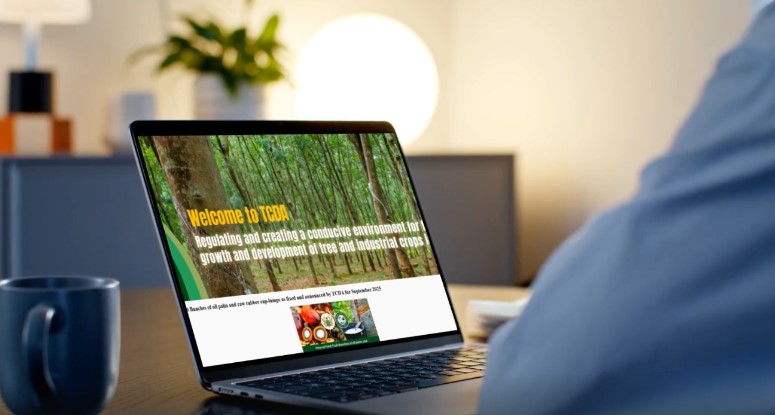
- Bookmark the official TCDA and NACOC websites.
- Subscribe to verified agency newsletters or social media handles to catch official updates in real time.
- Create a small in-house compliance checklist with URLs, phone numbers, and names of actual agency contacts.
- Before making any payment, pick up the phone and call the agency directly.
- Share agency warnings with your peers. Many scams are stopped by word of mouth before they spread widely.
Why Staying Compliant Pays Off
Exporters who comply early not only avoid penalties but also gain reputational benefits. TCDA has hinted at “preferred exporter” treatment for compliant operators, which could mean faster document processing and better access to market data.
In the cannabis sector, early compliance could be even more valuable. NACOC has said it will prioritize transparent and well-documented applicants once licensing starts.
Building your compliance file now, with land records, seed sourcing, and THC testing data, will put you ahead of the curve once the application window opens.
FAQs
Final Take
Big regulatory shifts create space for both progress and predation. Ghana’s 2025 rules are aimed at strengthening value addition and formalizing sensitive sectors, but the early months are prime time for copy-cats and “connection men.”
The safest path is straightforward: use official channels, verify every fee and form, and never outsource compliance to a stranger on social media.
If something sounds easy and urgent, pause. Then check the source.
Related Posts:
- Cameroon Hunting - Species, Seasons, and Regulations
- How a Second Passport Is Opening the World to West…
- What Are the Languages Spoken in Ghana? 12…
- 10 Best Football Clubs in Ghana Everyone Should Know
- 10 Interesting Facts About Ghana You Probably Didn’t Know
- How to Make Kelewele - Ghana's Spicy Fried Plantains

